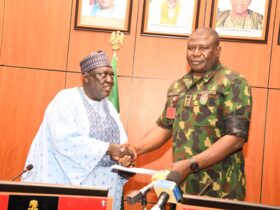An Abuja-based policy think tank, Agora Policy, said climate change poses severe and multiple threats to Nigeria’s current and future development.
In a maiden report titled “Climate Change and Socio-Economic Development in Nigeria” released on Monday, the policy think-tank said this should be taken more seriously by the Nigerian government and other critical stakeholders.
“It is evident that climate change is not a marginal or peripheral issue that the government and the people of Nigeria can take lightly,” the report said.
The report acknowledges and details a plethora of climate-related initiatives, including policies, programmes and projects and even the 2021 climate change law, put in place or undertaken by successive Nigerian governments. It however claims that the potentials of these initiatives and interventions are undercut by the absence of commensurate action, lack of synergy and inadequate funding.
According to the report, Nigeria, despite its relatively low emission profile, is already bearing the brunt of the effects of changes in climatic conditions and adverse weather events but the tolls could be significantly higher.
Unless urgent and bold actions are taken, the report noted that Nigeria risks becoming one of the worst-affected countries by climate change, with grave implications for the country’s currently fragile economic, social and human development indicators.
“Climate change is compounding poverty challenges in Nigeria and impeding the attainment of Sustainable Development Goals.
“Climate change is already increasing hunger, poverty, disease burden, migration, conflict and insecurity in Nigeria. It is damaging infrastructure, changing Nigeria’s coastlines, fuelling desertification, producing water scarcity, facilitating erosion and resulting in the loss of revenue for states and the national government,” it said.
The report noted that as of 2020 Nigeria loses at least $100 billion annually to the effects of climate change and the country may lose trillions of dollars in manufacturing, construction and oil and gas assets likely to become stranded as the world gravitates to a green economy.
“Nigeria risks becoming a stranded country. “Climate change has the potential to further jeopardise Nigeria’s economic development and alter its geographical, social and political trajectory for decades,” the think tank said.
The report highlights the different channels through which adverse effects of climate change could worsen in Nigeria and further compound the country’s developmental challenges.
Some of the highlighted areas include projected 2.9- and 5.7-degree Celsius rise in temperature across different ecological zones in the country; increased occurrence of floods, droughts, erosion and rising sea levels; the likelihood that 75 per cent of the delta could be lost and further adverse effects on agricultural yields, food security, health burdens, water and energy sufficiency, peace and security, and adequacy and longevity of critical infrastructure.
However, the think tank identifies opportunities for Nigeria to address climate change while supporting economic growth and resilience.
“Climate change offers opportunities for economic competitiveness, energy security, and sustainable development. There are many climate-led opportunities that Nigeria can explore to enable rapid economic growth, create jobs for a rapidly growing youthful and urbanising population, and address high levels of abject poverty and inequality through a just transition,” it said.
While urging Nigeria to consciously pursue a climate-compatible development agenda, the report recommended the following strategies to the country.
“Investing in renewable energy and energy efficiency, promoting climate-smart agriculture, embracing green manufacturing, harnessing natural resources for adaptation, and enhancing disaster risk reduction systems.
“Leveraging climate action to pursue economic development in Nigeria is not only a viable but an essential strategy and the global transition from a high-carbon economy to a low-carbon economy is already well underway and will produce winners and losers across the world,” it said.
ALSO READ: Ending Ukraine/Russia war, climate action tops UNGA78 debate










